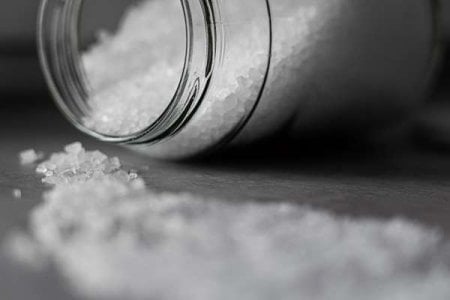Study reveals salt’s ‘killer’ impact on health
Salt is a ubiquitous part of the Australian diet.
People sprinkle it on hot chips and their cooked meals. This accessible condiment adds depth and flavour to every dish, making it more enjoyable.
While salt is essential for human health in small doses, most Australians are ingesting far more than the recommended amount—and all that excess sodium can have deadly consequences.
A concerning new report has revealed that around 2,500 Australians die each year from illnesses caused by high salt intake.
The independent Grattan Institute report highlights the staggering impact salt has on the nation's health, including increased risk of hypertension, heart disease, stroke, and kidney disease.
How exactly does salt harm our bodies? Consuming too much sodium causes blood pressure to rise by causing your body to retain more fluid. Over time, this extra strain on the heart and blood vessels can lead to life-threatening problems.
With this alarming information, the study urged the federal government to overhaul its salt reduction policy, which it claimed was lagging behind other developed nations.
The report said: ‘Australian governments know that salt is a big problem. That’s why in 2021, they set a target to reduce salt intake by at least 30 per cent by 2030. But there has been almost no progress towards the target, and there is no plan to get there.’
The trouble is that it is difficult for individuals to control their salt intake due to the sheer amount of hidden sodium in processed and prepared foods. Around 75 per cent of salt in the average Australian's diet is added during manufacturing. This makes the real salt content of foods 'invisible' to consumers.
For example, just one serving of two-minute noodles or a meat pie contains about half the maximum recommended daily salt intake. Even foods that don't taste salty, like bread and breakfast cereals, can be secretly packed with salt.
Our fondness for fast food doesn't help either. Australians are eating more fast food than ever before—dishes that are often loaded with salt to enhance the flavour.
The Grattan Institute argued that governments must intervene, as individuals and businesses can't fix this issue alone.
‘Individuals and businesses can’t change this on their own. Instead, we rely on governments to make sure that the food we buy is safe to eat and to make it easier to choose healthy options,’ the report explained.
It continued: ‘But while other countries are pushing ahead with reforms to food labelling, taxation, and regulation, Australia is being left behind.’
To reduce salt consumption and save lives, the report suggested making current salt reduction targets mandatory for food manufacturers by 2027. Expanding menu labelling to reveal salt content and closing loopholes that allow some foods to dodge limits could also have a great impact.
If these measures reduce Australians' salt intake as targeted, modelling indicates the government could save $35 million in healthcare costs annually.
So, what can you do to take control of your salt intake? Check nutrition labels to choose lower sodium options at the supermarket.
Watch your intake of salty sauces, condiments and processed meats. With some minor changes, you can ensure salt doesn't put your health at risk.

What are your thoughts on this, members? Do you have any tips on how to avoid consuming food with high salt content? Let us know in the comments below!
People sprinkle it on hot chips and their cooked meals. This accessible condiment adds depth and flavour to every dish, making it more enjoyable.
While salt is essential for human health in small doses, most Australians are ingesting far more than the recommended amount—and all that excess sodium can have deadly consequences.
A concerning new report has revealed that around 2,500 Australians die each year from illnesses caused by high salt intake.
The independent Grattan Institute report highlights the staggering impact salt has on the nation's health, including increased risk of hypertension, heart disease, stroke, and kidney disease.
How exactly does salt harm our bodies? Consuming too much sodium causes blood pressure to rise by causing your body to retain more fluid. Over time, this extra strain on the heart and blood vessels can lead to life-threatening problems.
With this alarming information, the study urged the federal government to overhaul its salt reduction policy, which it claimed was lagging behind other developed nations.
The report said: ‘Australian governments know that salt is a big problem. That’s why in 2021, they set a target to reduce salt intake by at least 30 per cent by 2030. But there has been almost no progress towards the target, and there is no plan to get there.’
The trouble is that it is difficult for individuals to control their salt intake due to the sheer amount of hidden sodium in processed and prepared foods. Around 75 per cent of salt in the average Australian's diet is added during manufacturing. This makes the real salt content of foods 'invisible' to consumers.
For example, just one serving of two-minute noodles or a meat pie contains about half the maximum recommended daily salt intake. Even foods that don't taste salty, like bread and breakfast cereals, can be secretly packed with salt.
Our fondness for fast food doesn't help either. Australians are eating more fast food than ever before—dishes that are often loaded with salt to enhance the flavour.
The Grattan Institute argued that governments must intervene, as individuals and businesses can't fix this issue alone.
‘Individuals and businesses can’t change this on their own. Instead, we rely on governments to make sure that the food we buy is safe to eat and to make it easier to choose healthy options,’ the report explained.
It continued: ‘But while other countries are pushing ahead with reforms to food labelling, taxation, and regulation, Australia is being left behind.’
To reduce salt consumption and save lives, the report suggested making current salt reduction targets mandatory for food manufacturers by 2027. Expanding menu labelling to reveal salt content and closing loopholes that allow some foods to dodge limits could also have a great impact.
If these measures reduce Australians' salt intake as targeted, modelling indicates the government could save $35 million in healthcare costs annually.
So, what can you do to take control of your salt intake? Check nutrition labels to choose lower sodium options at the supermarket.
Watch your intake of salty sauces, condiments and processed meats. With some minor changes, you can ensure salt doesn't put your health at risk.
Key Takeaways
- Around 2,500 Australians pass away each year from illnesses linked to high salt intake.
- The Grattan Institute has found that three-quarters of salt in our diets is added during food manufacturing, making it 'invisible' to people when making food choices.
- Australia has been urged to overhaul its salt reduction policy, which currently needs to be improved compared to other developed countries.
- The Grattan Institute recommended making Australia’s salt limits mandatory by 2027 and expanding menu labelling to include salt content.
What are your thoughts on this, members? Do you have any tips on how to avoid consuming food with high salt content? Let us know in the comments below!









